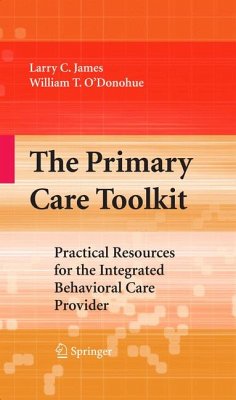Practical Resources for the Integrated Behavioral Care Provider
Edited by Larry James, Tripler Army Medical Center, Honolulu
and William O'Donohue, University of Nevada, Reno
I'm working in a primary care facility.
Now...what am I doing here?
Ideally, the integration of behavioral health into the medical setting brings effective, coordinated treatment and increased satisfaction for both practitioner and patient. In reality, however, the results can be far from perfect-and far from integrated. The Primary Care Toolkit introduces mental health professionals to the best possibilities for the collaboration while preparing them for the crucial differences between primary care and traditional mental health settings, to make the transition as worthwhile and non-traumatic as possible.
The editors, experts on collaborative care (and astute judges of its potentials and pitfalls), have packed the Toolkit with hands-on, evidence-based, practical information, including handouts, protocols, inventories, and reference lists. Readers will improve their medical literacy, learn how to make more effective use of the clinic's patient education and marketing resources, and uncover key consultation skills. And chapters for primary care physicians and administrators help all parties understand the synergy underlying integrative care.
A sampling of the Toolkit's features:
- Assessment and treatment guidelines for core illnesses (chronic pain, heart disease, anxiety, depression), and issues (treatment compliance, obesity, smoking, somatization) encountered in primary care.
- Hiring and interview protocols for administrators.
- Training programs and issues.
- Financial and billing models.
- Quality management/improvementtools.
- Review of the current CPT codes.
The Primary Care Toolkit is a safety net for the clinician adjusting to collaborative practice, giving new "team players"-clinical and health psychologists, psychiatrists, mental health nurses, and clinical social workers, as well as the professionals working with them-greater confidence and competence.
Dieser Download kann aus rechtlichen Gründen nur mit Rechnungsadresse in A, B, BG, CY, CZ, D, DK, EW, E, FIN, F, GR, HR, H, IRL, I, LT, L, LR, M, NL, PL, P, R, S, SLO, SK ausgeliefert werden.
Hinweis: Dieser Artikel kann nur an eine deutsche Lieferadresse ausgeliefert werden.
"For mental health professionals working in primary care settings, this guide provides advice and information on collaboration care. ... James (psychology, Tripler Army Medical Center) and O'Donohue ... compile 20 chapters by psychologists and other mental health professionals and physicians from the US, who address assessment and treatment guidelines for illnesses ... . They also provide a review of Current Procedural Terminology codes and lists of resources for obtaining patient handouts." (SciTech Book News, March, 2009)









